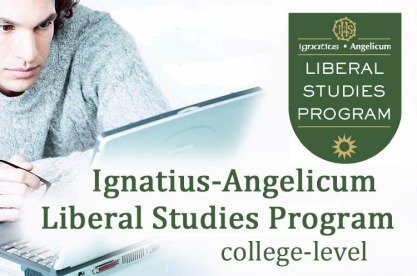Why should our child begin the Angelicum Great Books Program at age 14 or 15?
1. STUDENTS HAVE THE TIME THEN, OFTEN NOT LATER: As Dr. Mortimer J. Adler wrote in the article cited below: “If we are going to have general human schooling in this country, it has to be accomplished in the first twelve years of compulsory schooling…” Dr. Adler noted that the responsibilities and financial pressures of college costs, adulthood and marriage effectively end the availability of sufficient leisure time necessary for general, liberal educational opportunities for most college-age students, in favor narrow specialized, vocational education. Twenty years later, in 1990 Adler reaffirmed his view that the Great Books – the “ backbone of liberal education” as Adler called them – should be studied in the high school years, before age eighteen: “As far as the United States is concerned, the reorganization of the educational system would make it possible for the system to make its contribution to the liberal education of the young by the time they reached the age of eighteen…The tremendous waste of time in the American educational system must result in part from the fact that there is so much time to waste.” (The Great Conversation by Dr. Mortimer J. Adler; 2nd Ed., 1990, p.55; Encyclopaedia Britannica, Inc., Chicago)
2. THE HUMANITIES CAN AND SHOULD BE COMPLETED AT THAT AGE: Catholic philosopher Jacques Maritain held virtually the identical view as Dr. Adler on this matter: ”I advance the opinion, incidentally, that, in the general educational scheme, it would be advantageous to hurry the four years of college, so that the period of undergraduate studies would extend from sixteen to nineteen. The BA would be awarded at the end of the college years [at 19 years of age], as crowning the humanities…” (Education at the Crossroads)
3. EARLY EDUCATION IS IMPORTANT: Nobel Prize-winning economist Gary Becker (University of Chicago) says studies show that by age 16 government job-training programs for 16-year-olds do not succeed because they cannot overcome the failure to learn skills in the first 16 years.

Angelicum Student Attending a Great Books Online Class
4. IT SAVES LOTS OF MONEY: Private four-year colleges now cost approximately $25,000 per year, $100,000 for a degree(= about $750-800 per credit hour). The Angelicum Great Books Program high school credit track is only about $995 per year, or $83 per credit hour ($75 with early enrollment discount through July 5th). The college credit track costs only $2,950 per year, or $249 per credit hour (only $221 with early enrollment discount through July 5th).
 5. IT IS AFFORDABLE FOR FAMILIES: The Angelicum Payment Plan will reserve a seat in the class of your choosing for only 10% down. The other 90% is payable in 9 monthly installments of 10% each, beginning September 1, 2012. For the high school credit track that is only $99 down, and $99 each month, beginning September 1, through May. For the college track, that is only $295 down, and $295 per month, September through May. The Angelicum Academy offers a generous 50% tuition reduction for all other siblings (may not be combined with other discounts).
5. IT IS AFFORDABLE FOR FAMILIES: The Angelicum Payment Plan will reserve a seat in the class of your choosing for only 10% down. The other 90% is payable in 9 monthly installments of 10% each, beginning September 1, 2012. For the high school credit track that is only $99 down, and $99 each month, beginning September 1, through May. For the college track, that is only $295 down, and $295 per month, September through May. The Angelicum Academy offers a generous 50% tuition reduction for all other siblings (may not be combined with other discounts).
6. STUDENTS MAY WITHDRAW AT ANY TIME WITHOUT FURTHER OBLIGATION: Students may withdraw at any time, and upon 72 hours notice to us (an email is fine) no further payments and no penalties are due. It’s a low risk way to test the actual classes. By the way, despite our generous withdrawal policy, our withdrawal rate runs only about 5% over the full academic year (i.e., 95% complete the full academic year. The U.S. college graduation rate currently stands at about 50 percent, according to the New York Times.




 Many people are aware that Mortimer Adler was the principal editor of the Great Books of the Western World set of 60 volumes published by Encyclopaedia Britannica. Few know he also published a shorter list of the great books he found most influential in his life. I think it worth presenting them here, for those who haven’t the time to engage in broader reading of the Great Books.
Many people are aware that Mortimer Adler was the principal editor of the Great Books of the Western World set of 60 volumes published by Encyclopaedia Britannica. Few know he also published a shorter list of the great books he found most influential in his life. I think it worth presenting them here, for those who haven’t the time to engage in broader reading of the Great Books. Adler wrote that the educated person –a status not attainable until many years of study and reflection – besides reading great books and reflecting assiduously on the great ideas, also required discussing the books and ideas, and having years of enlarging experiences, including suffering, and travel.
Adler wrote that the educated person –a status not attainable until many years of study and reflection – besides reading great books and reflecting assiduously on the great ideas, also required discussing the books and ideas, and having years of enlarging experiences, including suffering, and travel. This sumptuous, insightful, epiphany-riddled overview of life’s narratives as seen in the works of such writers as Blake and Balzac, Dickens and Dostoevsky, Faulkner and Roth, Shakespeare and Joyce, is the incisive and lavish result of a course, “Rites of Passage,” that Arnold Weinstein has taught at Brown for years.
This sumptuous, insightful, epiphany-riddled overview of life’s narratives as seen in the works of such writers as Blake and Balzac, Dickens and Dostoevsky, Faulkner and Roth, Shakespeare and Joyce, is the incisive and lavish result of a course, “Rites of Passage,” that Arnold Weinstein has taught at Brown for years.

 Dear Dr. Adler,
Dear Dr. Adler, We also learn from the past by considering the respects in which it differs from the present. We can discover where we are today and what we have become by knowing what the people of the past did and thought. And part of the past — our personal past and that of the race — always lives in us.
We also learn from the past by considering the respects in which it differs from the present. We can discover where we are today and what we have become by knowing what the people of the past did and thought. And part of the past — our personal past and that of the race — always lives in us.


 One wishes that the Harris poll ad asked people if they had read the book or merely watched the movie. This list is the ultimate confirmation of the dumbing down of America. If these are the ten books one must read before dying, count me out. Why nothing by Mark Twain, whose novels, I believe, are certainly superior to anything on the Harris poll list? Why no mention of Shakespeare or Tolstoy? Why no George Eliot? Why no Ralph Ellison or Richard Wright? Those writers, whose works can change the way you see the world, are not on the list because most Americans have never read them and because their writings have never been converted into a major computer-generated movie.
One wishes that the Harris poll ad asked people if they had read the book or merely watched the movie. This list is the ultimate confirmation of the dumbing down of America. If these are the ten books one must read before dying, count me out. Why nothing by Mark Twain, whose novels, I believe, are certainly superior to anything on the Harris poll list? Why no mention of Shakespeare or Tolstoy? Why no George Eliot? Why no Ralph Ellison or Richard Wright? Those writers, whose works can change the way you see the world, are not on the list because most Americans have never read them and because their writings have never been converted into a major computer-generated movie. The publication of the book is like a tree falling in the forest: If no one heard it, did it fall? If no one reviews a book, how will readers know that it exists? Why does it matter if America’s literary culture is dying? It matters because the ability to read challenging books helps make one more independent-minded. It encourages a way of thinking that is not a product of the mass media. It gives one the ability to think for oneself and entertain contrary opinions, and the freedom from dependence on Hollywood for a view of the world. The literary culture is the last bastion of the individualist. Our society, our culture, even our economy depend on preserving freethinking dissidents. And there is nothing that works better to free a mind from cant and superstition than to engage with the ideas of the world’s greatest writers.
The publication of the book is like a tree falling in the forest: If no one heard it, did it fall? If no one reviews a book, how will readers know that it exists? Why does it matter if America’s literary culture is dying? It matters because the ability to read challenging books helps make one more independent-minded. It encourages a way of thinking that is not a product of the mass media. It gives one the ability to think for oneself and entertain contrary opinions, and the freedom from dependence on Hollywood for a view of the world. The literary culture is the last bastion of the individualist. Our society, our culture, even our economy depend on preserving freethinking dissidents. And there is nothing that works better to free a mind from cant and superstition than to engage with the ideas of the world’s greatest writers.
 If you’re still in the GB program right now, cherish this time! I really believe that you will never have another class quite as good as this one. Even though I have some very excellent teachers at …..college (which everyone should come to, by the way lol)… none of them will be able to compare to what Mr. Bertucci, Dr. Taylor, Dr. Redpath and Dr. Hancock have given me, the ability to think and ask questions. I know it seems like a fairly common thing to have, but frankly, it is grossly underdeveloped in many people. Just know how lucky you all are to have this, and I hope you all enjoy every moment of it as much as I did.
If you’re still in the GB program right now, cherish this time! I really believe that you will never have another class quite as good as this one. Even though I have some very excellent teachers at …..college (which everyone should come to, by the way lol)… none of them will be able to compare to what Mr. Bertucci, Dr. Taylor, Dr. Redpath and Dr. Hancock have given me, the ability to think and ask questions. I know it seems like a fairly common thing to have, but frankly, it is grossly underdeveloped in many people. Just know how lucky you all are to have this, and I hope you all enjoy every moment of it as much as I did.




